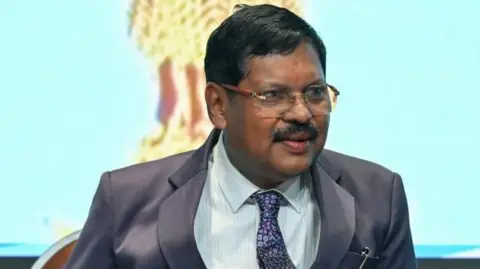In a serious breach of judicial security and decorum, an Indian lawyer threw his shoe at Chief Justice BR Gavai during court proceedings in Delhi on Monday, protesting what he perceived as disrespectful comments about Hindu beliefs.
The incident occurred during routine court proceedings when lawyer Rakesh Kishore launched his shoe toward the bench, reportedly striking Chief Justice Gavai and another justice before falling behind them. As security personnel escorted him from the courtroom, Kishore declared, “India will not tolerate insult to Sanatan Dharma,” referring to the Hindu faith.
The attack stems from a controversial ruling last month when Chief Justice Gavai dismissed a petition to reconstruct a seven-foot idol of Lord Vishnu at a temple in Madhya Pradesh state. During those proceedings, the Chief Justice remarked, “This is purely publicity interest litigation… Go and ask the deity himself to do something.” These comments sparked significant controversy within India’s Hindu community.
Chief Justice Gavai maintained his composure throughout the incident, directing lawyers to continue their arguments without interruption. The Supreme Court subsequently suspended Kishore from legal practice, though authorities later announced no criminal charges would be filed.
Prime Minister Narendra Modi swiftly condemned the attack, speaking personally with Chief Justice Gavai and declaring the incident had “angered every Indian.” The Prime Minister emphasized that such actions have no place in Indian society.
The incident highlights growing tensions between India’s secular judicial system and religious sensitivities. Chief Justice Gavai had previously addressed criticism of his earlier remarks, affirming his respect for all religions, according to official court records.
In Indian culture, as in many societies, throwing shoes at someone represents a profound sign of disrespect and humiliation. Similar incidents have occurred globally, including a 2008 shoe-throwing protest against then-U.S. President George W. Bush in Iraq and a recent attack on Kenyan President William Ruto.
The breach has prompted calls for enhanced security measures in India’s highest court, while also sparking broader discussions about the balance between judicial independence and religious sentiment in the world’s largest democracy.
Chief Justice Gavai has not issued any public statement regarding the incident, maintaining the dignity of his office while allowing the judicial process to address the security breach through appropriate channels.
The episode represents one of the most serious security breaches in the history of India’s Supreme Court, an institution that serves as the guardian of the world’s largest democratic constitution and typically commands profound respect across Indian society.

